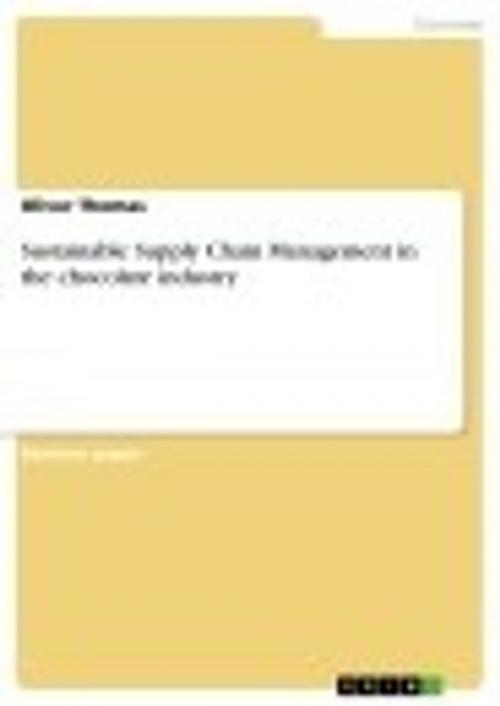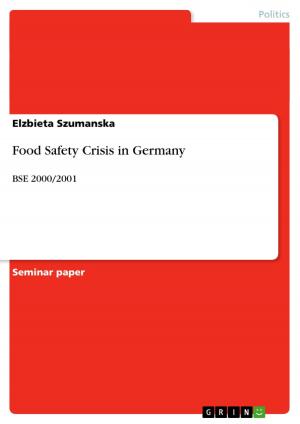Sustainable Supply Chain Management in the chocolate industry
Business & Finance, Management & Leadership, Production & Operations Management| Author: | Oliver Thomas | ISBN: | 9783640901609 |
| Publisher: | GRIN Publishing | Publication: | April 28, 2011 |
| Imprint: | GRIN Publishing | Language: | English |
| Author: | Oliver Thomas |
| ISBN: | 9783640901609 |
| Publisher: | GRIN Publishing |
| Publication: | April 28, 2011 |
| Imprint: | GRIN Publishing |
| Language: | English |
Seminar paper from the year 2011 in the subject Business economics - Supply, Production, Logistics, grade: 1,0, Leipzig Graduate School of Management, course: Logistik, language: English, abstract: Sustainability has become a significant issue in many companies as it affects their reputation among customers. At the same time, outsourcing and globalization have resulted in the spreading out of supply chains across continents. Therefore, the focus of implementing sustainability has shifted from the single organization to the entire supply chain. This is of particular importance for chocolate manufacturers with their multinational supply chains as they are held responsible by the public for any irregularities which happen in their supply chain. Chocolate brand owners have been confronted with increasing criticism and pressure from politics and public due to the lack of sustainability in their supply chain. A current example is the TV documentary 'Schmutzige Schokolade', a film about child labor on cocoa farms in Ivory Coast, for which the Danish filmmaker Miki Mistrati blames the chocolate manufacturers. The film, which was broadcasted on ARD on October, 6th, 2010, at 11:30p.m., has been sold altogether to 18 countries and was consequently watched by several million television viewers. This paper focuses on Sustainable Supply Chain Management in the chocolate industry. The following chapter contains a short theoretical introduction to the topic. It then focuses on giving an overview of the European, and there specifically on the German chocolate industry. Furthermore, it puts focus on the raw material cocoa from Ivory Coast, as cocoa butter and cocoa powder are among the main ingredients of chocolate and Ivory Coast is the world's largest cocoa producer country. The last two chapters include the description of the importance, weak points, challenges and possible concepts of Sustainable Supply Chain Management for cocoa. The paper finishes with a summary and an outlook.
Seminar paper from the year 2011 in the subject Business economics - Supply, Production, Logistics, grade: 1,0, Leipzig Graduate School of Management, course: Logistik, language: English, abstract: Sustainability has become a significant issue in many companies as it affects their reputation among customers. At the same time, outsourcing and globalization have resulted in the spreading out of supply chains across continents. Therefore, the focus of implementing sustainability has shifted from the single organization to the entire supply chain. This is of particular importance for chocolate manufacturers with their multinational supply chains as they are held responsible by the public for any irregularities which happen in their supply chain. Chocolate brand owners have been confronted with increasing criticism and pressure from politics and public due to the lack of sustainability in their supply chain. A current example is the TV documentary 'Schmutzige Schokolade', a film about child labor on cocoa farms in Ivory Coast, for which the Danish filmmaker Miki Mistrati blames the chocolate manufacturers. The film, which was broadcasted on ARD on October, 6th, 2010, at 11:30p.m., has been sold altogether to 18 countries and was consequently watched by several million television viewers. This paper focuses on Sustainable Supply Chain Management in the chocolate industry. The following chapter contains a short theoretical introduction to the topic. It then focuses on giving an overview of the European, and there specifically on the German chocolate industry. Furthermore, it puts focus on the raw material cocoa from Ivory Coast, as cocoa butter and cocoa powder are among the main ingredients of chocolate and Ivory Coast is the world's largest cocoa producer country. The last two chapters include the description of the importance, weak points, challenges and possible concepts of Sustainable Supply Chain Management for cocoa. The paper finishes with a summary and an outlook.















